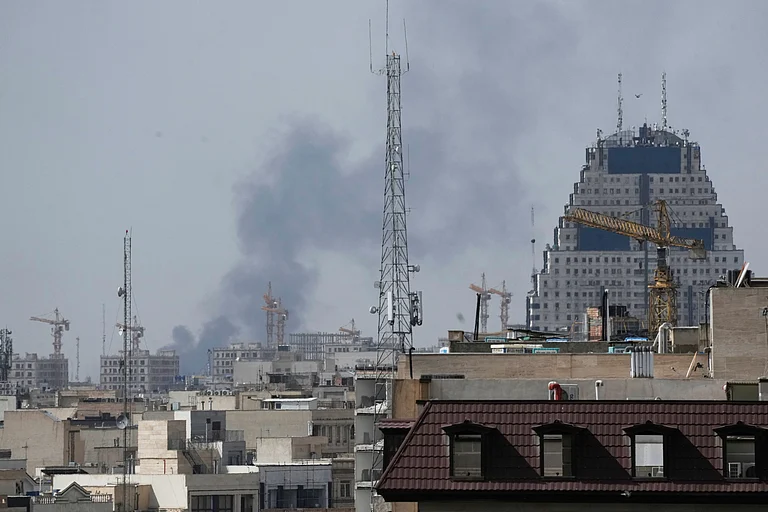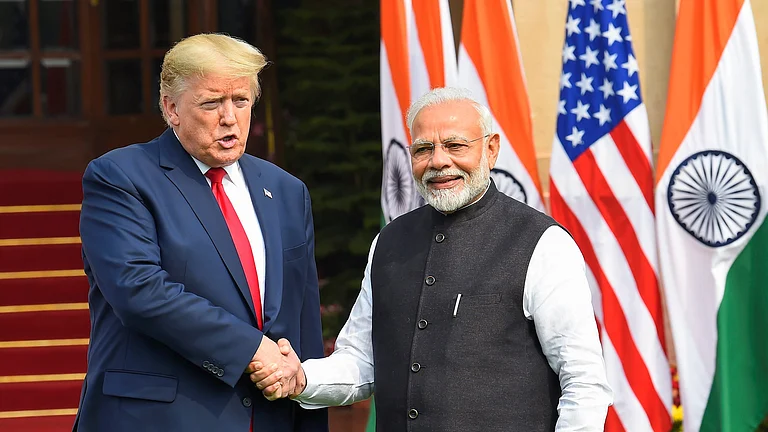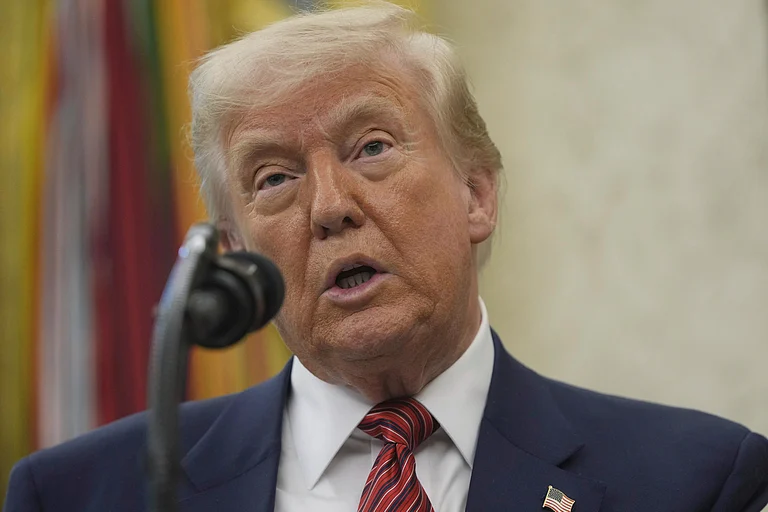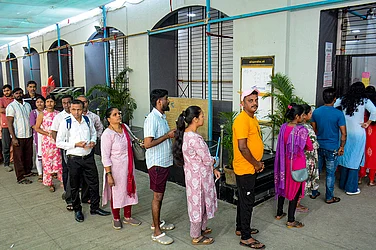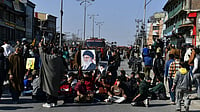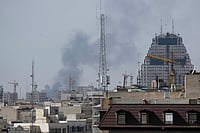
Kashmiri traders have sought a slew of concessions from the Central government to shield themselves from tariff-induced losses
The horticulture sector in Kashmir has taken a hit due to heavy US imports; export orders have dried up since the tariff hike announcement
The horticulture sector employs over 35 lakh people, whereas the handicraft and handloom sectors employ over 4.22 lakh artisans
Noorudin Azad, 70, a dry fruit trader in Srinagar, who largely deals with the selling of walnuts and almonds, has been closely following the news of the US levying tariff on India. With the Donald Trump administration pushing the implementation of 50 per cent tariff on exports from India from August 27, Noorudin is worried that the prices of dry fruits and other horticulture produce will be impacted hard.
The US is a major market for India when it comes to the import of horticulture products like Washington apple, California walnut and almond. This has severely influenced the prices of Kashmiri produce. Kashmir’s economy has taken a major hit since the tariff threat has started looming, say traders.
The 50 per cent tariff has also impacted the handicraft sectors. The orders have dried up. Horticulture and handicrafts remain the mainstay of Kashmir’s economy. Traders and businessmen have sought a slew of concessions from the government, including an interest waiver, export incentives and a reduction in the GST.
Noorudin, who has been operating the dry fruit business for over 20 years, said: “There is a heavy import of dry fruits from the US and other countries and the 50 per cent tariff being implemented from August 27 will certainly influence the market. The imports are significantly higher than what is produced from Kashmir, hence the impact will be huge.”
Several traders have said that the prices of local horticulture produce have dropped due to heavy imports from US and this has impacted the livelihood of growers. As per government estimates, the horticulture sector contributes about 6-7 per cent to the Gross State Domestic Product (GSDP) of Jammu and Kashmir. It employs over 35 lakh people and nearly seven lakh families are dependent on it. Kashmir contributes nearly 95 per cent to walnut production in India. In the year 2023-24, the Union Territory produced 2,064.3 metric tons (MT) of apples.
The production of walnut and almond stood at 307.11 MT and 11.20 MT, respectively.
Earlier, on account of heavy hit received by growers from the imports of horticulture produce from the US, the Kashmir Valley Fruit Growers Cum Dealers Union sought an increase in import duties. In a letter written to Prime Minister Narendra Modi, it said: “Our country is one of the world’s largest producers of apple. However, the arrival of imported apple in our country has put the fruit industry of J&K, Himachal and Uttarakhand in a very precarious situation, pushing the small and marginal fruit growers in mental agony. The heavy flow of imported apple in the Indian markets and sale thereof is not only disastrous for small and marginal growers of Kashmir, but also results in huge losses to the state exchequer.”
The latter added: “We fear that slashing down the tariff on Washington apple will significantly increase import in Indian markets, shrinking the space for the domestic product of apple. In fact, the growers have consistently suffered heavy losses since the past several years due to one or the other reason like turmoil, devastating deluge in September 2014 and untimely strong hail storm, gusty winds and heavy rains causing enough damages in fruit orchards of the Valley. Prime Minister of India is requested to kindly consider necessary measures for saving the fruit industry of J&K and kindly avoid negotiation on reciprocal tariffs announced by President Donald Trump. Instead, efforts should be made for the imposition of 100 per cent duty on the arrival of Washington apples in Indian markets.”
Bashir Ahmad Bashir, president of the Kashmir Valley Fruit Growers Association, said that duties on apple imports from the US should be increased to shield the horticulture sector from losses. “The imports have remained a major worry for our farmers and caused losses to growers. Now, with US tariffs increasing, we must also hike our tariffs,” he said.
The handicraft sector is another industry that is likely to take a hit. The sector saw a rebound in exports post covid pandemic. In 2023-24, handicraft exports touched Rs 1,162.29 crore, double from Rs 563 crore in 2021-22.
Javid Ahmad Tenga, president of the Kashmir Chamber of Commerce and Industries (KCCI), said that given the impact of the tariff hike on the economy of Kashmir, they have sought concessions in taxes and interest rates. “We have written to the Union Finance Minister highlighting the impact of the tariff hike. We hope that the government will find some solution. We have requested the government to bail us out. We have sought interest subvention, export incentives and reducing the GST to five per cent.”
Tenga said that the export tariffs are impacting artisans involved in the production of different handicrafts items like carpets, shawls and wood-carved products.
With the handicrafts and handlooms sector employing over 4.22 lakh artisans, the officials from Jammu and Kashmir’s Handicrafts department hoped that India and US will reach some agreement on tariffs. “We are waiting for the Centre to announce some incentives,” said an official.







